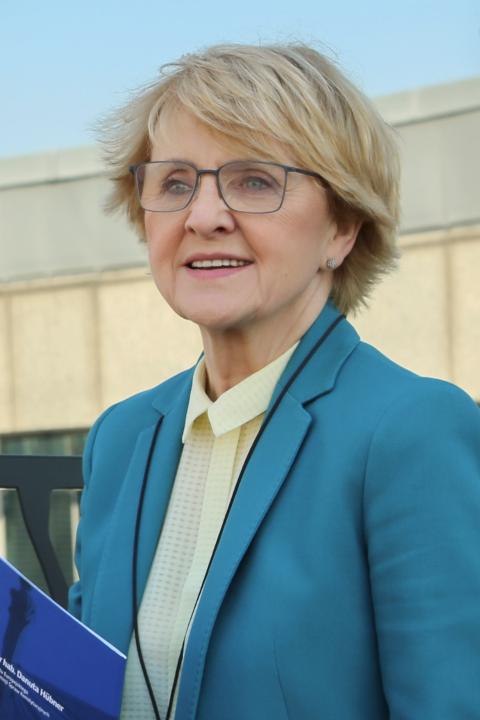European Economic
and Social Committee
Every five years, European citizens go to the polls to elect their representatives to the European Parliament (EP), the only directly elected institution of the European Union. In 2024, 720 newly elected members will usher in the tenth legislature. During the five-year term, they will play a decisive role in shaping Europe, its institutions and policies, its place in the polarized global world and its commitment to common values.
All elections are important. This is how democracy starts. But we know that democracy is much more than elections. We can see democratically elected governments who practice democracy while bending the rule of law. Elections, even if fair and free, are not the only guarantee of democracy, nor are they the only factor that determines democracy. This is why voters should be actively engaged in the elections.
The past five years have been marked by a number of almost existential challenges for the European Union. We had to deal with Brexit and its consequences. This was followed by the COVID pandemic, Russia's brutal, inhuman invasion of Ukraine, ensuing economic challenges, including the energy crisis and high levels of inflation. We coped with all these unexpected disruptions while pursuing our key strategic objectives of double transition to a green and digitally competitive economy. A changing geopolitical environment led to far reaching sanctions imposed by the EU and its democratic partners on Russia, to moving towards de-risking our dependencies on China and putting our relations with the US on an unprecedented solid foundation. The Union has also launched the first ever European defence industry programme, which will come to fruition in the years ahead.
The 2024 elections will be a battle for Europe. The electoral campaign will need to meet the expectations of citizens, respecting their role in European decision making. There is no doubt that issues like migration, climate change and support for Ukraine defending their homeland against Russian aggression concern all of us who care about freedom, democracy and peace. Elected politicians will need to spare no effort to ensure the effective rebooting of enlargement policy. When debating with candidates about their task for the next five years, they must be made aware, that if elected, they will have to take into account that the European Union is part of a crumbling world, divided between democracies and authoritarian regimes. 2024 is a year of elections taking place across the world, in countries populated by 4 billion inhabitants.
We, Europeans, will be paying close attention to the decisions of Americans going to the polls to elect their president. The transatlantic relationship will be an important issue during our European election debates. It is the duty of European politicians and political parties to spare no effort in engaging with citizens and encouraging them to make their voices heard. Geopolitical uncertainty makes it more important than ever. Political parties that present their candidates for the elections often have different opinions on issues that are of crucial importance for our lives. We can have a say and impact the future of Europe, which is our future, only if we, as citizens, engage in debating with candidates and go to the polls. Sometimes we get frustrated and angry. But that is exactly why our active participation in political electoral dialogue is of such importance.
In 2019, for the first time ever, the turnout of the European elections slightly surpassed 50 percent. It was the vote of young Europeans that helped push the participation rate. On the one hand, it is good news that half of those eligible to vote used their right to vote. But on the other hand, it means that half of us, European citizens with voting rights, did not vote. In 2024, we cannot afford to let others decide who represents us in European decision making and legislating. Low participation reduces the legitimacy of those elected and translates into their weaker role in the European Parliament. It is a major responsibility of political parties to encourage their potential voters to go to the polls.
For decades, Europeans have seen governments as their representatives in the EU. The 2024 elections offer a window of opportunity to demonstrate the real power of the EP as the voice of citizens. There will be first time voters. In five Member States, 16-year-olds will vote. Young people will have different expectations of politicians. We have seen this during the Conference on the Future of Europe, we hear it now during the follow up panels organised by the European Commission. Politicians should use the upcoming European elections as a process to build a new generation of voters and politicians, as a window of opportunity to enhance transparent political education, as well as identity and trust building.
The communication strategy of the EP for the 2024 EU elections is focusing on mobilising abstainers and first-time voters, helping others involved, including the media, NGOs, companies and individuals, supporting the non-partisan civic engagement of European citizens and organisations in promoting the importance of going to vote.
We already see foreign interference in the European elections, hybrid operations in disinformation, destroying trust in institutions and politicians and producing divisive narratives. This is happening before elections, there will be more of it during the elections and there will be post electoral pathologies. Laws against disinformation must be enforced. National and European actions will not be enough, we need meaningful funding supporting a 'whole-of-society' approach to expose disinformation and its perpetrators, as this affects peoples' daily life and their strategic choices.
With these elections, the fate of democracy, freedom and security is at stake. And the vote matters.
Danuta Hübner, Member of the European Parliament (EPP Group)
